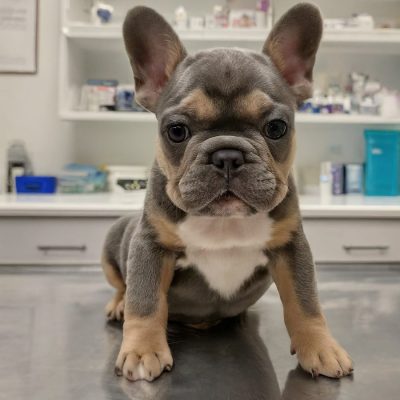Selecting the right vet clinic for your French Bulldog is crucial for ensuring their health and well-being. Your veterinary team is your partner is pet care. Its essential you feel comfortable and confident in the staff; from the front desk on back to the Veterinary team. Here are some key factors to consider:
- Reputation and Recommendations: Ask your breeder or rescue as well as friends and family that are fellow pet owners for recommendations. You can also check reviews to get an idea of the reputation of local veterinary clinics. A quick google and Facebook search can tell you a lot. Do any of the staff own French Bulldogs? What kind of clinic are they? (small, large, family or chain, only small animal or combination large and small) Do they specialize in anything? Are there a lot of positive reviews for the clinic?
- Size of the Clinic: There are benefits and disadvantages of both small and large clinics. In a small clinic they probably only have one or two doctors and a small number of support staff. This is really nice because you usually see the same doctor and the same faces assisting. You get to know each other and they remember your specific pet (their likes, dislikes and health concerns). However, it may be harder for them to assist with emergency service due to a smaller staff. Larger clinics usually have several doctors and a large number of support staff. Due to the larger staff, they can probably handle unexpected emergencies and might have after hours care. You can probably make appointments with less advanced notice. However, you will probably have changing doctors and vet staff at visits. Both options can offer exceptional service, just be aware and choose your preferred experience.
- Specialization: Look for a veterinarian who has experience working with French Bulldogs or brachycephalic breeds. Frenchies can have specific health needs, including respiratory issues (nares and palates especially) and skin conditions, so having a vet who understands these breed-specific concerns is extremely beneficial. Anesthesia can also be a little bit more complicated with these special pups. Frenchies have become so popular there are a lot of vets that have a great deal of experience with bulldog breeds. I would highly recommend searching out one of these vets.
- Credentials and Licensing: Ensure that the veterinarian and their staff are licensed and certified. You can usually find this information displayed in the clinic or on their website. If the clinic boasts continuing education, that’s also an amazing value.
- Accessibility and Location: Consider the location and accessibility of the veterinary clinic. It should be conveniently located and easily accessible in case of emergencies. I use a vet clinic that’s a little further away than I would prefer, however they are a Bulldog specialty clinic and I feel it’s worth the drive. Just make sure you’re willing and have reliable transportation when needed. You don’t want to put off medical care because you can’t make the drive.
- Clinic Facilities: Visit the clinic in person, if possible, to assess the cleanliness and organization of the facilities. A well-maintained clinic with modern equipment is indicative of good quality care. Like most things, pet health care is always evolving. Make sure you choose a vet that stays current with medication, procedures, technology and diseases.
- Communication Style: Choose a veterinarian who communicates effectively and listens to your concerns. They should be able to explain medical issues clearly and provide guidance on preventive care and treatment options. The first person you usually talk with, either in person or on the phone, is the front desk staff. Are they friendly? Can they answer your questions appropriately or get you to someone that can?
- Emergency Care Services: Inquire about the clinic's emergency care services and after-hours availability. It's essential to know where to turn in case of an emergency. Routine appointments are easy to schedule for vet clinics, however true full-blown emergencies can be very difficult. Some clinics are not able to take emergencies on the weekend or after hours due to staff size. That’s OK, but its crucial there is a plan for the emergency that always seems to fall on a holiday or weekend. Do they partner with a local emergency hospital? What’s the protocol? This may be one of the most important questions you discuss with a potential new clinic.
- Cost and Payment Options: Understand the clinic's fee structure and payment options in advance. While cost shouldn't be the only factor, it's important to find a veterinarian whose services are affordable for your budget. The clinic should be able to give you estimates clearly showing fees for routine services, such as vaccines, microchipping, flea/tick medication, spays and neuters. Sometimes for dentals and health issues it’s a little harder to get a precise cost up front due to changes as medical services move forward and the health concern is being diagnosed. However, they should still be able to give you a range of pricing, as well as, cost for blood tests, urine tests, x-rays, ultrasounds, etc.
- Additional Services: Consider whether the clinic offers additional services such as grooming, boarding, or specialized treatments. Having access to these services under one roof can be convenient for you and your pet. It also adds a little extra piece of mind when you leave your pet at a facility that has a doctor on staff to treat any unexpected situation.
By considering these factors and taking the time to research and visit potential veterinarians, you can find the best fit for pet’s healthcare needs. Trust your instincts and choose a veterinarian with whom you feel comfortable and confident. Building a trusting relationship with your vet is vital for your Frenchie's longevity and quality of life.
Quick links


